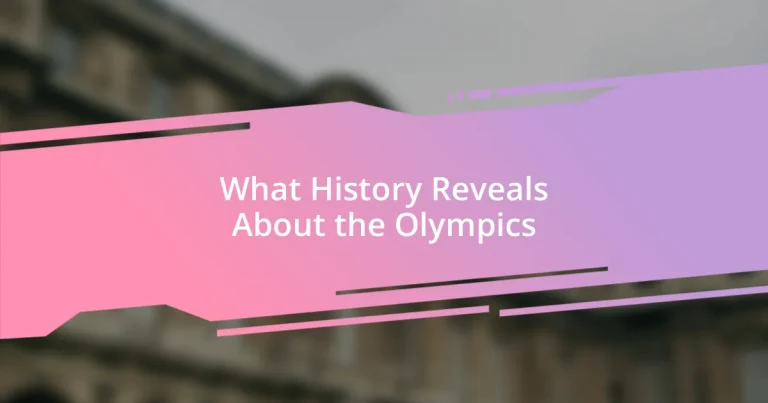Key takeaways:
- The Ancient Olympics originated in 776 B.C. as a festival honoring Zeus, emphasizing unity among warring city-states through sports.
- Key historical events include Jesse Owens’ triumph at the 1936 Berlin Games, the tragic 1972 Munich attack, and the inclusive spirit of the Sydney 2000 Olympics.
- The modern Olympics serve as a platform for social progress and global unity, promoting messages of peace, diversity, and resilience in the face of adversity.
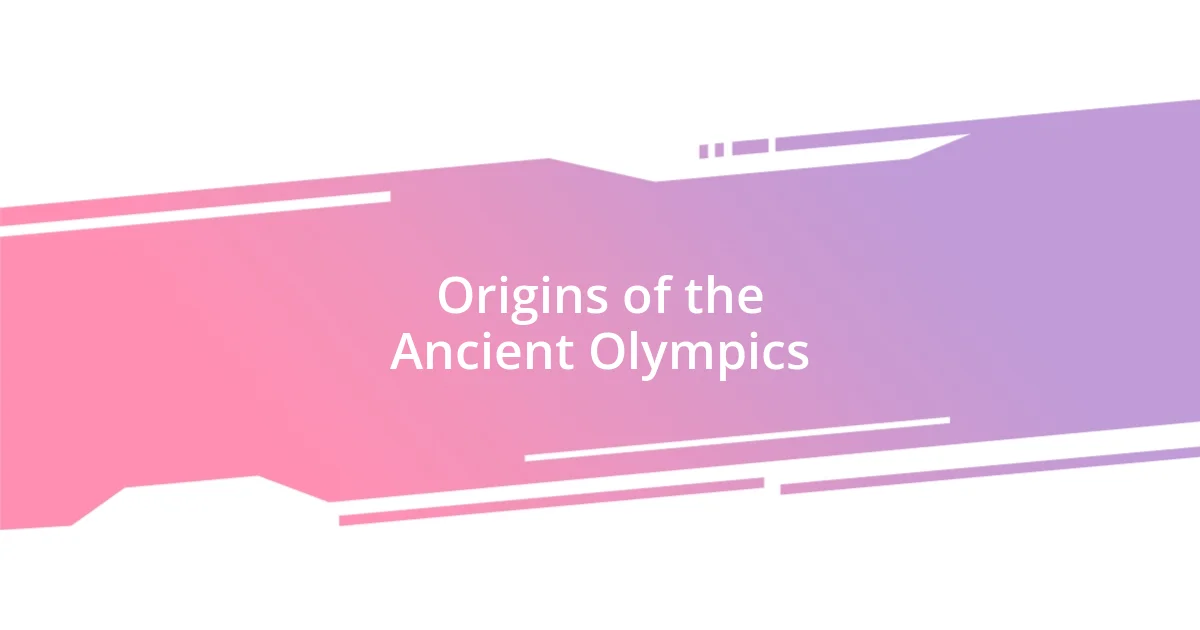
Origins of the Ancient Olympics
When we think about the Ancient Olympics, it’s fascinating to consider their humble beginnings around 776 B.C. in Olympia, Greece. The games started as a festival to honor Zeus, and I can’t help but feel a sense of awe at how something so grand today was once just a local celebration. Imagine the excitement buzzing in the air as athletes competed not for gold medals but for olive wreaths—symbolizing peace, victory, and connection to the gods.
Reflecting on the significance of these games, it strikes me how they were more than mere competitions. They represented a rare period when warring city-states would put aside their differences to gather and celebrate athletic prowess. Doesn’t it remind you of how sports unite us even today, transcending boundaries? Just picture the communal spirit in the stadium, echoing the cheers of spectators who rallied behind their favorites. It’s a beautiful testament to the power of sport in fostering unity.
Interestingly, events like running, wrestling, and boxing reflected not just physical skill but also the values and ideals of Ancient Greek culture. Each contest was steeped in tradition, defining the societal importance of discipline and honor. I often wonder if today’s Olympians feel that same weight of history on their shoulders—an awareness that they’re part of something much larger than themselves. It makes the games not just about personal achievement, but about connecting to a legacy that stretches back over two millennia.

Key Events in Olympic History
I find it intriguing to highlight the modern era of the Olympics, especially the 1936 Berlin Games. This event was not merely about athletic prowess; it became a powerful stage for political ideologies. I can’t help but recall the images of Jesse Owens, an African-American athlete, winning four gold medals and effectively challenging Hitler’s narrative of Aryan supremacy. His remarkable triumph resonated deeply within me, underscoring how sports can transcend barriers and deliver potent messages to the world.
In stark contrast, the dramatic events of the 1972 Munich Games left an indelible mark on Olympic history. The tragedy of the terrorist attack on Israeli athletes shifted the tenor of the games from celebration to mourning. Reflecting on how that moment altered the Olympics forever, I often think about the resilience displayed by athletes and nations in the face of adversity. It really drives home the notion that the Olympics are not just about competition; they’re about the human spirit overcoming challenges, a sentiment that resonates deeply with me.
Moving forward to the Sydney 2000 Olympics, I’m reminded of how this event was celebrated for its spirit of inclusivity and environmental consciousness. Athletes from around the globe came together, and I remember watching with pride as the games emphasized respect for all people and the planet. The imagery of unity and celebration made me realize just how much the Olympics can inspire global harmony, showcasing how sports can foster connections across cultures and nations, something I believe we all long for in our shared experiences.
| Key Event | Year |
|---|---|
| Berlin Games | 1936 |
| Munich Tragedy | 1972 |
| Sydney Olympics | 2000 |
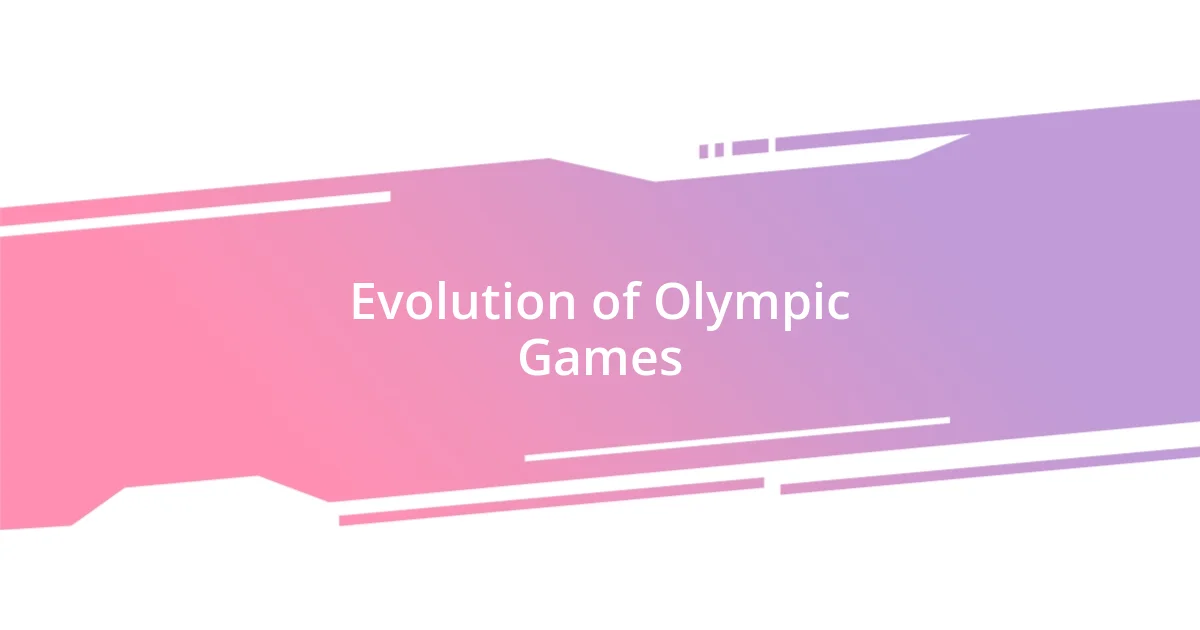
Evolution of Olympic Games
As I delve into the evolution of the Olympic Games, I am struck by how they transformed from local festivals into a global phenomenon. The introduction of the modern Olympics in 1896 was a pivotal moment that resurrected the ancient spirit, showcasing a diverse array of sports that celebrated international competition. Just thinking of how Pierre de Coubertin envisioned this revival brings a sense of admiration for his determination to unite the world through sport.
- The first modern Olympics took place in Athens, Greece, in 1896.
- Over 280 athletes from 13 nations competed in 43 events.
- The Olympic movement has since expanded to include Winter Games, beginning in 1924.
- Today, over 200 countries participate, showcasing thousands of athletes.
This remarkable journey—marked by both triumphs and tragedies—mirrors the progress of society itself. I often reflect on how each Olympic cycle not only celebrates athletic excellence but also serves as a mirror of cultural shifts and global relations. For instance, the inclusion of women competitors, which began gradually in the 1900 Paris Games, was a truly revolutionary step, one that resonates with my belief in equality. It’s inspiring to consider how these changes reflected broader societal movements, making the Olympics a living tapestry of human history and progress.
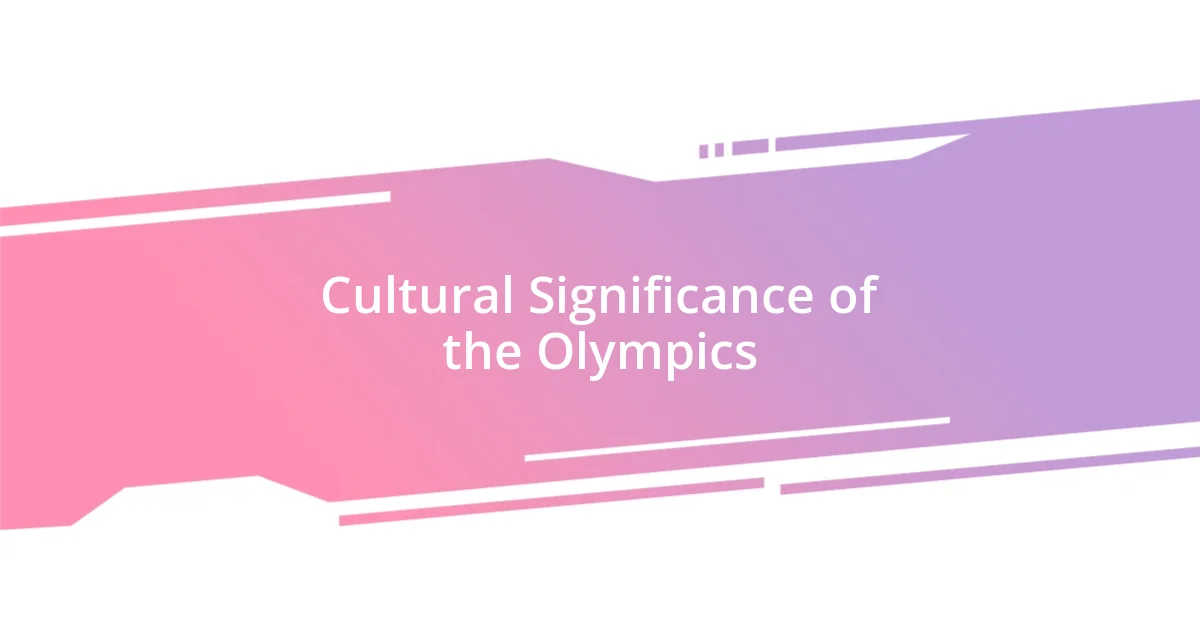
Cultural Significance of the Olympics
The cultural significance of the Olympics is profound, touching not just a single nation but the entire world. I often think about how the Games serve as a unique platform where diverse cultures converge, each bringing its traditions and values. Remember those moments when athletes don their national uniforms and march during the opening ceremony? It’s a beautiful spectacle that fosters pride and unity, allowing nations to celebrate their heritage while engaging in friendly competition.
What strikes me is how the Olympics can act as a mirror for societal values, reflecting changes over time. For example, consider the inclusion of LGBTQ+ athletes and how their visibility in recent Games speaks volumes about progress in acceptance. When I watched athletes like Tom Daley win gold while proudly representing his truth, it was a poignant reminder of how sports can break down walls and promote inclusivity. It makes me wonder, how often do we see such powerful moments of representation in everyday life? The Olympics, in this sense, are more than just a sporting event; they tell the story of humanity evolving.
Additionally, the Olympics often become a canvas for social commentary and activism. I vividly recall the powerful gestures made by athletes like Colin Kaepernick and the discussions that followed. His silent protest echoed loudly across the globe, challenging viewers to confront issues of race and justice. It’s fascinating how a moment in sports can galvanize conversations that extend far beyond the arena, evoking emotions like hope, anger, and aspiration. These instances highlight how the Games weave cultural narratives that resonate with people, reminding us of the potential of sports to influence society in meaningful ways.
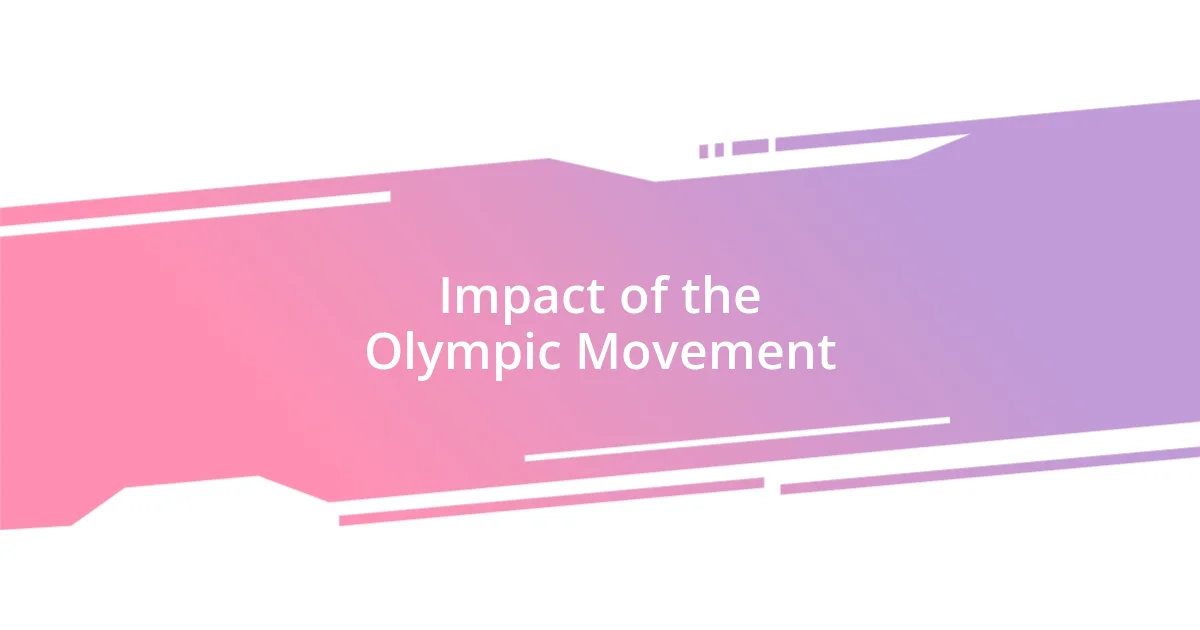
Impact of the Olympic Movement
The Olympic movement has profoundly shaped our global landscape, weaving together nations through a shared passion for sport. I remember watching the Olympics as a child, feeling a sense of excitement not just for the competitions but for the unity it fostered among diverse countries. When athletes from opposing nations cheered each other on, it felt like a small glimpse of what world peace could be, doesn’t it?
Every Olympiad offers a unique opportunity for cultural exchange. I often think about the vibrant gatherings of athletes from every corner of the world. The energy during those opening ceremonies is electrifying; I still feel a rush of pride just recalling how different languages and customs come together in celebration. It’s as if sport becomes this universal language, breaking down barriers, one handshake at a time. Isn’t it fascinating how a single event can inspire global camaraderie?
Moreover, the impact of the Olympic movement extends to social progress and activism. Watching athletes use their platforms to rise up against injustice speaks volumes to me. I recall the awe I felt when American sprinters Tommie Smith and John Carlos raised their fists in protest at the 1968 Games, a moment that ignited discussions and inspired generations. It leads me to wonder, how do these moments of bravery echo in our own lives? The Olympics aren’t just a showcase of athletic prowess; they’re a powerful reminder of the ability of sport to drive change, challenge norms, and unite us all in the quest for a better world.
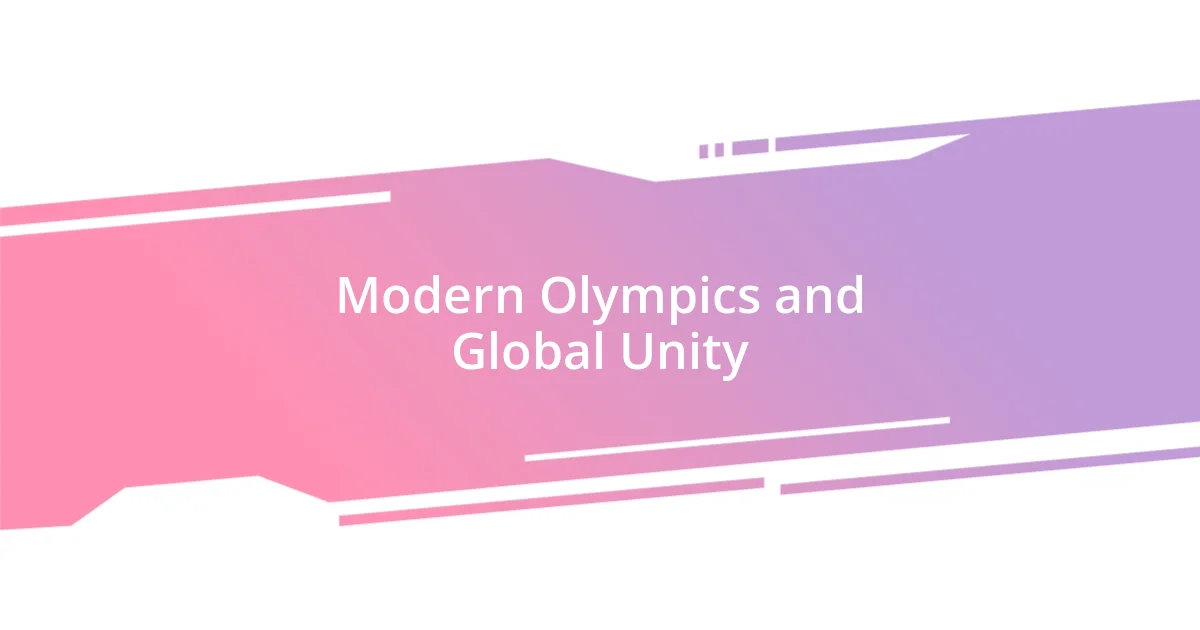
Modern Olympics and Global Unity
Modern Olympics often symbolize a rare moment when nations set aside their differences to come together in celebration of human spirit and achievement. I still remember the palpable energy during the closing ceremonies, where athletes, regardless of their country’s politics or standings, embrace and celebrate their efforts. It’s hard not to feel emotional watching those moments, knowing how much work goes into representing one’s country on such a grand stage. Doesn’t it make you wonder about the stories behind those smiles and tears?
Over the years, I’ve noticed how the Olympics have increasingly become a platform for messages of peace and friendship. The Olympic Truce, which calls for a cessation of hostilities during the Games, seems more relevant today than ever. It’s striking to realize how, in times of conflict, countries can pause and unite for a common goal. I often think about how much more respectful dialogue our world could foster if we embraced this spirit more often. Isn’t that something we can aspire to beyond the Games?
Furthermore, the influence of the Olympics on youth around the globe is undeniably profound. Seeing young athletes from various backgrounds fueling their dreams in this international spotlight inspires a sense of hope. I often reflect on my own childhood and the way the Olympics ignited my passion for sports. It makes me ponder: how many lives are positively impacted by watching their heroes compete, pushing boundaries while promoting understanding and diversity? The potential for the Olympics to inspire the next generation towards unity and cooperation is a testament to the event’s enduring legacy.
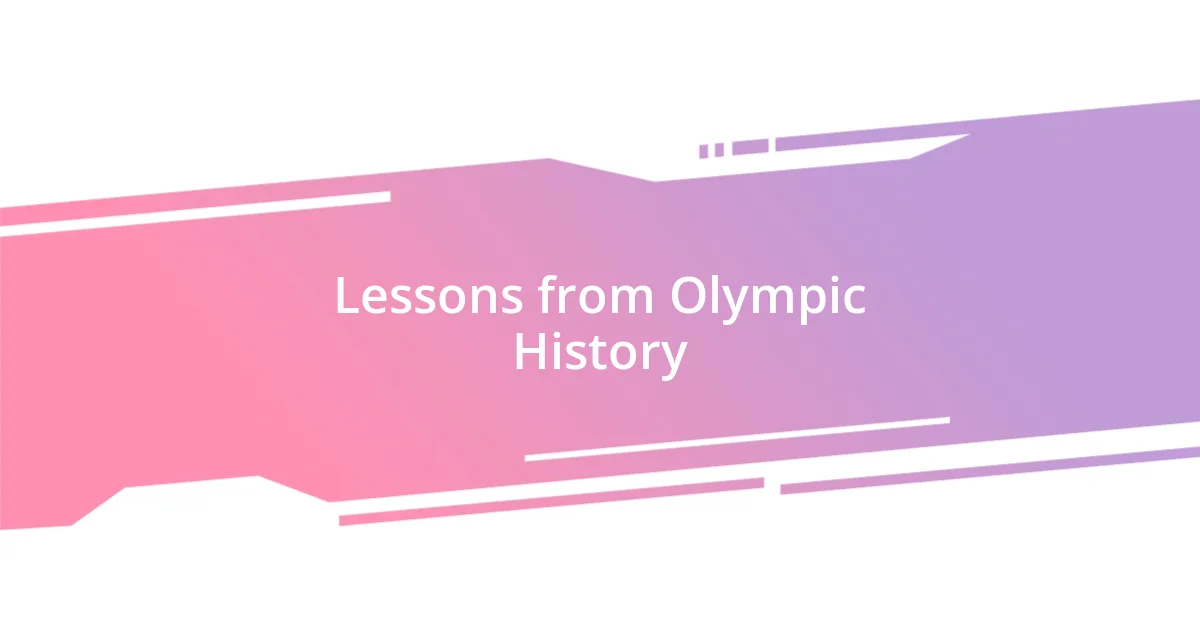
Lessons from Olympic History
There’s something profoundly striking about how the Olympics have taught us resilience through its ups and downs. Just think about the stories of athletes who faced setbacks, like the American swimmer Michael Phelps—who overcame personal struggles and emerged even stronger. It’s a lesson that encouraging perseverance in the face of adversity applies not just to sports but to our everyday challenges as well, don’t you agree?
I’m often reminded of the 1980 Moscow Olympics, where several countries boycotted the event in protest. This situation highlighted the often-political underpinnings of such a global gathering, showcasing that the Olympics can reflect the complexities of international relations. I can’t help but wonder how different the landscape of sports would be if we set our differences aside, even just for a moment, to focus on what unites us—our shared love for the games.
In observing the evolution of the Games, I feel that respect for diversity is a vital lesson we’ve gleaned over time. The inclusion of athletes with disabilities in the Olympic framework, such as during the Paralympics, demonstrates that sports can truly transcend boundaries. Once, while volunteering at a local sports event, I saw firsthand how the power of sport can transform lives. It makes me think: should we all strive to foster an environment where everyone, regardless of their background, has the opportunity to shine on a global stage?












